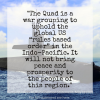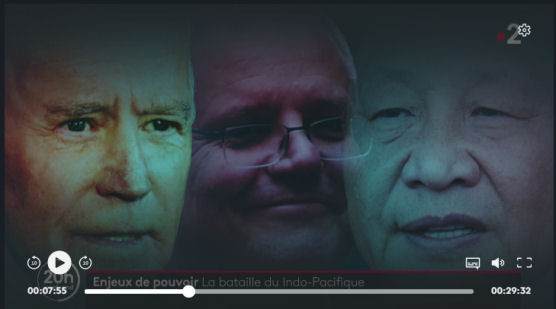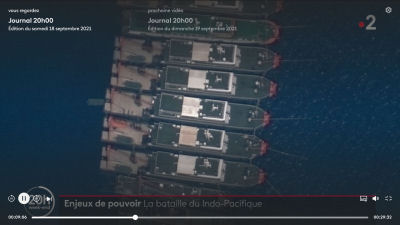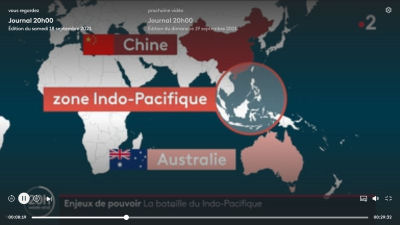President Biden
The Quad is a US-led grouping of countries promoting war, not peace
 The Quad summit scheduled in Sydney on 24 May was cancelled due to the last minute announcement that US President Biden will not be doing a stopover in Australia from the G7 talks in Hiroshima, Japan, 19-22 May. No US replacement for Biden was announced. Instead, the Quad war summit of 4 heads of states and governments – US President Joe Biden, Indian Prime Minister Narendra Modi, Japanese Prime Minister Fumio Kishida and Australian Prime Minister Anthony Albanese – was moved to the sidelin
The Quad summit scheduled in Sydney on 24 May was cancelled due to the last minute announcement that US President Biden will not be doing a stopover in Australia from the G7 talks in Hiroshima, Japan, 19-22 May. No US replacement for Biden was announced. Instead, the Quad war summit of 4 heads of states and governments – US President Joe Biden, Indian Prime Minister Narendra Modi, Japanese Prime Minister Fumio Kishida and Australian Prime Minister Anthony Albanese – was moved to the sidelin
Nordstream pipeline sabotage - who stood to gain? Censorship and Mass media reporting
Yesterday I became aware of the terrifying circumstance where the Nordstream1 and Nordstream2 pipelines have been sabotaged by huge explosions, soon after the time when US helicopters were reportedly in the area.[1]
This is why the Biden family corruption matters: Miranda Devine | Will Cain Podcast
Translation of French Foreign Minister interview re Oz-French-US-submarine debacle
 "Biden is like Trump without the Tweets." The British are known for their "permanent opportunism." "Boris Johnson is like a fifth wheel." US State Department falsely claimed it communicated with the French. China is attempting to make the China Sea into a kind of internal sea. Australia is losing sovereignty to America. US submarines would arrive ten years later than the French ones, so urgency cannot be the reason for breach of contract. (French Minister for Foreign Affairs).
"Biden is like Trump without the Tweets." The British are known for their "permanent opportunism." "Boris Johnson is like a fifth wheel." US State Department falsely claimed it communicated with the French. China is attempting to make the China Sea into a kind of internal sea. Australia is losing sovereignty to America. US submarines would arrive ten years later than the French ones, so urgency cannot be the reason for breach of contract. (French Minister for Foreign Affairs).
Co-dependency is known to lead partners of people with grave emotional and mental problems into embarassing situations. These kinds of compromise are achieved through manipulation by flattery or pressure on approval-seeking and disapproval-avoiding spouses. Was this the situation for Scott Morrison, who, although Mr Biden could not remember Scott's name, a day or two before, was suddenly convinced by Biden and his team, to seriously snub France, whilst leaving parliament mostly in the dark, in a move that will cost us all even more money but also even more than money. Is China really such an unreasonable threat a world, when America has an order of magnitude more military bases than any other country? Do we really prefer to be completely remade in the image of Walmart, as we become just another new military base for the United States? Is this really just another 19th century trade-war, but with nuclear submarines instead of galleons? Jean-Yves Le Drian is the French Minister for Europe and Foreign Affairs. He was interviewed by lead journalist Laurent Delahousse on France2 News on 18 September 2021, on the subject of Australia's sudden breach of its submarine contract with France for a projected contract with the United States. Inside is a detailed translation of that interview, for any Australians who are interested. The original interview is at Journal 20h00 - Édition du samedi 18 septembre 2021 en streaming - Replay France 2 | France tv.
LAURENT DELAHOUSSE: This evening the contract of the century has been broken and France has called its ambassadors home from the United States and Australia. What will be the outcome of this diplomatic crisis between allies? Answers this evening from the Minister for Foreign Affairs, Mr Jean-Yves Le Drian, who is our guest.
[Presentation of the other headlines] 
LAURANT DELAHOUSSE: A crisis, an earthquake, a conspiracy between allies. It’s hard to work out what’s happening in this affair. The breaching of the contract of the century on submarines is giving rise to consequences that go well beyond economic matters. These highlight a rearrangement of geopolitical maps and it remains to be known where France and Europe will end up in all this.
Before we go to Jean-Yves Le Drian, first, the fact for today: Paris decided to call home its ambassadors in the United States and Australia. (Names journalists Thomas Cuny, Lucie Berbey, and [?Noah d’Intar – unclear] responsible for producing this background segment)
“Alone in the corridors of Sydney Airport, France’s ambassador to Australia leaves the country. Just like his counterpart in Washington. The two diplomats have been called back to Paris for consultation. An exceptional diplomatic decision. Taken by the President of the Republic and justified in this communication from the Minister of Foreign Affairs.”
Communication from the Quai d’Orsay, 17 September 2021: “This exceptional decision is justified by the exceptional gravity of the announcement made on 15 September by Australia and the United States.”
A few hours earlier on the two continents, the French ambassadors spoke in unison of France’s indignation.
Translation from the French translation of the French Ambassador to the U.S.’s statement: “When we learned that the contract had been cancelled, this really made us angry.”
Jean-Pierre Thebault (French ambassador in Australia, statement in English translated into French): “I think it was a huge mistake. A nasty blow to our partnership. It was more than a contract. It was a partnership.”
The return of the ambassadors, France’s retort after the cancellation of Australia’s order for 12 French submarines to the value of 56 billion euros. Basically, Canberra has turned towards the United States and the United Kingdom. Since then there has been a continuing diplomatic crisis between France and these countries.
PASCAL BONIFACE : (Geopolitical expert – Director of the Institute of International and Strategic Diplomatic Relations (Directeur de l’Institut de Relations internationales et stratégiques (IRIS)) : “France, obviously, has been betrayed, as much by the Australians as by the United States, which are allies. And therefore, when there is a betrayal, one cannot accept it without reacting. Otherwise, one loses honour. And therefore it was completely legitimate, moral, and expected, that France should have a strong reaction, rather than be totally humiliated and not react in respect of that humiliation.”
Tonight, the U.S. State Department reacted to the French Government’s decision:
“We have been in close contact with our French allies. We understand their position and we are conscious of their intention to recall the Ambassador to Paris for consultation. France is an essential partner and our oldest ally.”
The emboldened text below is the only part that was verbally translated in the French news

Original U.S. communication appearing on screen :
US DEPARTMENT OF STATE
Attributed to State Department Spokesperson Ned Price: We have been in close contact with our French allies. We understand their position, and we are aware of their plans to recall Ambassador Etienne to Paris for consultations. France is a vital partner and our oldest ally, and we place the highest value on our relationship. The Transatlantic Alliance has fostered security, stability, and prosperity around the world for more than seven decades, and our commitment to those bonds and our work together is unwavering. We hope to continue our discussion on this issue at the senior level in coming days, including at UNGA next week, in line with our close bilateral partnership and commitment to cooperation on arrange of issues, including the Indo-Pacific.
Jean-Yves Le Drian and his American counterpart, Tony Blinken, will again find themselves in New York, at the seat of the United Nations. The Americans hope to continue the dialogue. [Reference to the last paragraph of the US communication above.]

LAURENT DELAHOUSSE : And in an attempt to better understand the Minister for Foreign Affairs is with us. Good evening Jean-Yves Le Drian.
LE DRIAN (FRENCH FOREIGN AFFAIRS MINISTER): Good evening.
LAUREN DELAHOUSSE : For many French people listening, to recall those ambassadors in response to such a humiliation, may not mean much.
LE DRIAN : It’s very symbolic. There have been lies, there has been duplicity, there has been a major breakdown in trust, there has been contempt. Therefore things are not good between us! Not good at all! It means there is a crisis, and at this moment, there is firstly a symbolic aspect – you recall your ambassadors in order to try to understand, but at the same time in order to show our countries which were once partners that we are really very angry, that there is really a crisis between us, and then, it is also, when the moment arrives, to reevaluate our position, in order to defend our interests both in Australia and in the United States.
LAURENT DELAHOUSSE : Mr Drian, you know as I do, this evening, that this measure isn’t going to stop Joe Biden from sleeping. He is happy with the contract, which is now in his favor.
LE DRIAN : Yes, but the fact that for the first time in the history of the United States and France we have recalled our ambassador for consultation is a heavy political action, signifying the importance of the crisis which exists today between our two countries. Also with Australia.
LAURENT DELAHOUSSE : Have Joe Biden and Emmanuel Macron spoken together?
LE DRIAN : Not to my knowledge.
LAURENT DELAHOUSSE : Has Mr Blinken spoken with you?
LE DRIAN : Today, no. Um, I heard your commentary, according to which there had been consultations with – between the Americans and ourselves – before the announcement. It isn’t true.
LAURENT DELAHOUSSE : Meaning that you knew nothing.
LE DRIAN : - an hour before -
LAURENT DELAHOUSSE : - nothing of these negotiations an hour beforehand. [… unclear]
LE DRIAN : That’s the reason I’m telling you that there has been duplicity, contempt, lying. It’s -
LAURENT DELAHOUSSE : And perhaps -
LE DRIAN : - You can’t play with alliances like that! We are allies.
LAURENT DELAHOUSSE : Mmm.
LE DRIAN : And therefore, when one has an ally, one does not treat them with brutality, with such unpredictability, a major partner which France is. So, there is really a crisis.
This also throws light perhaps on some kind of failure in our research services when one is not up to date …?
LE DRIAN : No. Yes. But really, in fact the agreement which was initiated by the United States an Australia was decided by a tiny little committee and I am not even sure that all the Australian and American ministers knew it.
LAURENT DELAHOUSSE : Mr Biden’s method bears a strong resemblance to Mr Trump’s.
LE DRIAN : Without the tweets.
LAURANT DELAHOUSSE : Without the tweets.
LE DRIAN : But, with a quite infuriatingly pompous announcement. Truth be told, seeing the US President and the Australian Prime Minister in company with Boris Johnson, announcing with such solemn ceremony, this breach and these new commitments, provides so many reasons to question the strength of the alliance.
LAURENT DELAHOUSSE: Are there no allies anymore on the American side? Is there a profound breakdown in trust?
LE DRIAN : There is a breakdown in trust.
LAURENT DELAHOUSSE : And you saw the same thing, well before. We remember 2013 and those French planes taking off. This is something that affected you deeply. It’s a new step after Afghanistan.
LE DRIAN : What’s for sure is that the United States are in the process of recentering their fundamental interests. They are in the process of going back on a particular commitment they had on the international level, and there is a real link between Afghanistan and what has just happened with the Australian contract, except that a true alliance – in a true alliance – people talk to each other. They don’t hide things. They answer our questions. One respects the other. One respects sovereignty. This was not the case. That is why there is a crisis.
LAURENT DELAHOUSSE : What we might have hoped for was, finally, a strong, intense, European reaction. I haven’t heard Mrs Merkel say anything today.
LE DRIAN: Yes, but -
LAURENT DELAHOUSSE : Aren’t you disappointed about that, in the circumstances? That, in the end, France finds herself alone, while power bypasses Europe?
LAURENT DELAHOUSSE : I’m not sure that we are really so alone in this business, because of various conversations we have had in these last 48 hours, including -
LAURENT DELAHOUSSE : Perhaps she [Merkel] will speak -
LE DRIAN : But wait, it’s not over – (Smiling)
LAURENT DELAHOUSSE: It’s not over. (Grinning.) It’s not over. (Turning to audience.)
In fact, in a moment we are going to look at how geopolitics in that region are on the move. And we are going to talk about this. Why has America made this choice and why is there new vitality in the Anglo-Saxon axis, and especially why this Asia-Pacific region has become the priority? It’s not new for Washington, which no longer looks to the west, and Europe, but towards the East and China. To understand what is at stake, [..] Presents background piece.
[BACKGROUND PIECE:]
[Picture of Australian Prime Minister Morrison with a rather stupid smile on his face.]
An unconcerned Australian Primeminister, at daggers drawn with Xi Jinping’s China. He has chosen his side and thrown himself into Joe Biden’s arms in a game of power, in that battle of influences that is playing out in the Indo-Pacific region. Australia is thousands of kilometers from the United States, but the two countries are united by their obsession with China. They can no longer bear that Peking (Bejing) wants to reign over this entire region. They have found their theatre, this submarine contract. For Australia, it’s a kind of all-risks insurance against Peking (Bejing), and too bad for the French.

THOMAS GOMART, DIRECTOR OF THE FRENCH INSTITUTE FOR INTERNATIONAL RELATIONS (DIRECTEUR DE L’INSTITUT FRANCAIS DES RELATIONS INTERNATIONALES (IRI)) : “Australia, which has been the object of multiple pressures from China, has in a way completely switched over into the American camp. That means that this contract also translates into a highly probable form of integration of the Australian Navy into the US Marines, in response to the threat from China.”
An agreement between Washington and Canberra, at a moment when military tensions are more and more lively in the region. Latest episode: [Picture of rows of Chinese ships in the Pacific] This armada of 200 chinese ships that Peking (Beijing) calls fishing boats, in fact a maritime militia financed by China in order to challenge the countries in the region. A perfect illustration of this middle-ranking empire in a quest for supremacy. 

ANTOINE BONDAZ : RESEARCHER – SPECIALIST ON CHINA. FOUNDATION FOR STRATEGIC RESEARCH (FONDATION POUR LA RECHERCHE STRATEGIQUE (FRS))
“This confrontation between Australia and China, brooding for years, culminated in 2020. (…) Peking [Bejing] imposed economic sanctions on Australia, with high taxes on wine, beef, barley, and coal. And it is also that economic war that is pushing the Australians to seek shelter under the American umbrella.”
LAURANT DELAHOUSSE : Before we return to geopolitics, what can we do next? What are you going to try to get, to negotiate for, with the Americans?
LE DRIAN : Firstly, there is the agreement we had with the Australians. It was an intergovernmental agreement that I signed myself in 2016 with Mr Morrison’s predecessor. This agreement contained previsions for a situation where one of the parties would want to leave it, since this is an agreement over 30 years.
LAURENT DELAHOUSSE : So, a violation -
LE DRIAN : So, there are arrangements that indicate, firstly, that the party wanting to break the agreement makes this known in writing, which we have not yet received. After that, 12 months of discussion are required, in order to arrive at a potential breaking of the agreement, if one of the parties wants to break it, at the end of 24 months. We are therefore going to act to ask for explanations from the Australians in order to know how they themselves expect to respect the agreement that they themselves signed. But, there is still another point that preoccupies me in this business.
LAURENT DELAHOUSSE : Mmm.
LE DRIAN : We were meant to deliver the first submarines by the beginning of the 2030s on a schedule that would take us to 2050. That’s been breached. It’s been breached, say the Australians, because China has militarized.
LAURENT DELAHOUSSE. Mmm.
LE DRIAN : And it was precisely in order to ensure the sovereignty of Australia that we entered these contracts with the Australians. But, in short, they say the contracts being broken because of China – And what’s America offering, today? What does the agreement just announced contain? There is an agreement to carry out a study which will end up in a contract after 18 months. A contract for nuclear submarines. Which means they are putting back the delivery date for the new submarines to 2040! All this despite the urgent context of China’s rise?
LAURENT DELAHOUSSE: Therefore, you don’t understand.
LE DRIAN: I don’t understand. And maybe that’s Australia’s choice. And they have also chosen to be truly subordinate to the United States in the region - perhaps a form of giving up a part of their sovereignty. It’s their decision, but it gives rise to questions -
LAURENT DELAHOUSSE : The political map is changing there and you are well aware of it. You know that’s been the long-term objective in the region, vis a vis China, since Barack Obama. What will France’s role and place be in that region? And Europe’s?
LE DRIAN : Keep in mind here the rise of a highly confrontational, militarily confrontational, United States-initiated Indo-Pacific strategy in the region.
LAURANT DELAHOUSSE : That’s not our position towards China?
LD DRIAN : It’s not our position. We know very well what China is doing.
LAURENT DELAHOUSSE : That’s not naïve? It’s the third […unclear]
LE DRIAN : Not at all, it’s not naïve. We know very well that China is rearming. We know very well what China’s behaviour is at the international level: How they are also trying in some way to make the South China Sea an internal sea, which they want to control completely. We know all that, and it must not be accepted. But we Europeans are in a situation where we only recently decided, three days ago, on our own Indo-Pacific strategy. We are in competition. We are in a situation of competition, sometimes violent competition. We are proposing an alternative model, but we are not operating within a rationale of systematic military confrontation – even if sometimes it is necessary to use military means.
LAURENT DELAHOUSSE : You have previously been known to use the word ‘innocence’, and sometimes even Europe’s ‘naivety’. Have we come to the end of that approach, on the diplomatic level, in the face of China, in the face of the United States, in the face of Turkey, in the face of Russia? Should we be changing gears, Minister?
LE DRIAN : I think that Europe is emerging from its innocence.
LAURENT DELAHOUSSE : But it seems urgent, Minister.
LE DRIAN : It seems urgent after Afghanistan and this business […] I think that Europe, if Europeans want to remain relevant, they must unite, and defend their own interests together, or their destinies will be totally different and we don’t want to got down that dark road.
LAURENT DELAHOUSSE : […] Two final questions: No santions, or no reactions, finally, vis a vis the role of the British in that deal? Finally, Boris Johnson has a smile on his face: I just got through Brexit. I’m with my Anglo-Saxon friends. I’ve regained my balance in the face of [… ? ]
LE DRIAN : No sanctions. I told you a moment ago that we recalled our ambassadors to see how we could reevaluate the situation. With Great Britain, it’s unnecessary. We are familiar with their permanent opportunism. So, there’s no point in recalling our ambassador to know this. Moreover, Great Britain, in this affair, is pretty much the fifth wheel.
LAURENT DELAHOUSSE : So, Boris Johnson is a fifth wheel. A few months from the election, your opponents will very quickly oppose you on many things. France’s decline, which is an important issue for the President of the republic, could be strongly represented?
LE DRIAN : The subject is respect, functioning alliances, clarity and truth. I think everyone can share this.
LAURANT DELAHOUSSE : No question of leaving NATO?
LE DRIAN : That’s not the issue. The President of the Republic has embarked on a review of NATO’s fundamentals. Regarding these fundamentals, the next summit will be in Madrid. The culmination of the new strategic concept will of course take into account what has just happened, but at the same time Europe must develop its own strategic compass. This will be under France’s responsibility, in the first half of 2022.
[Translation by Sheila Newman]

Recent comments